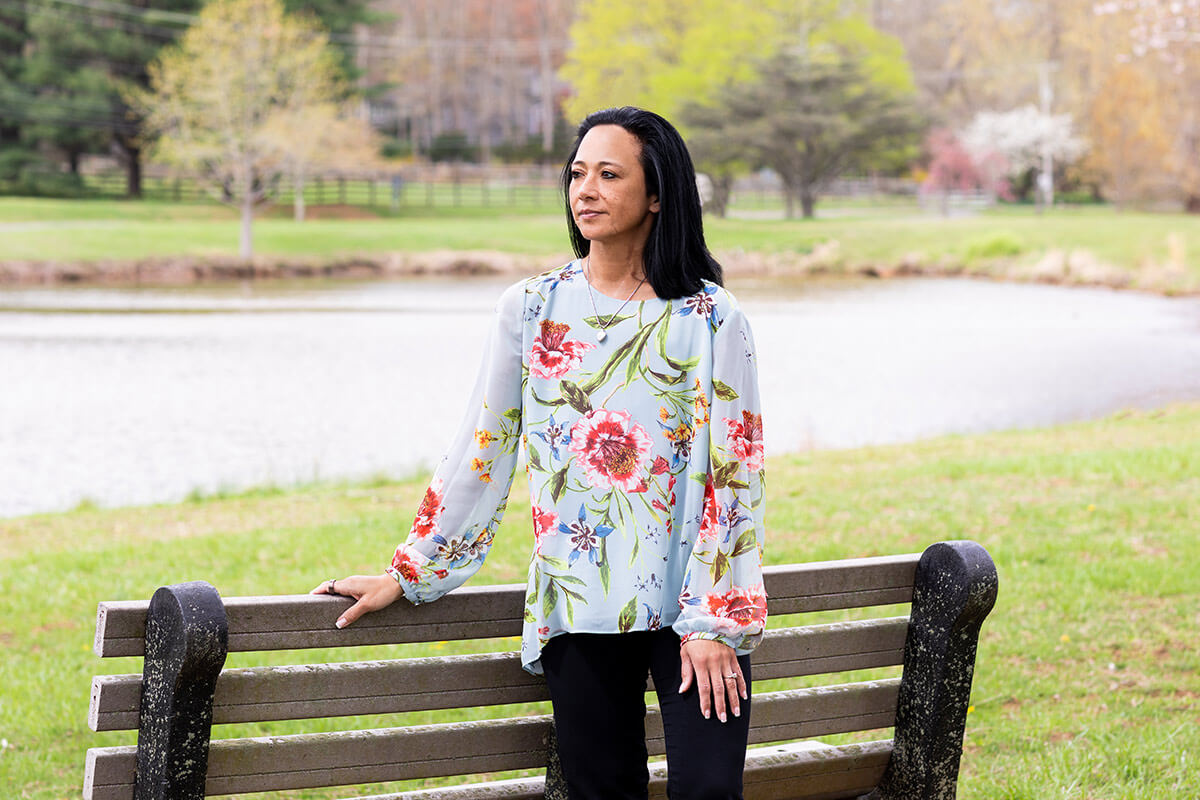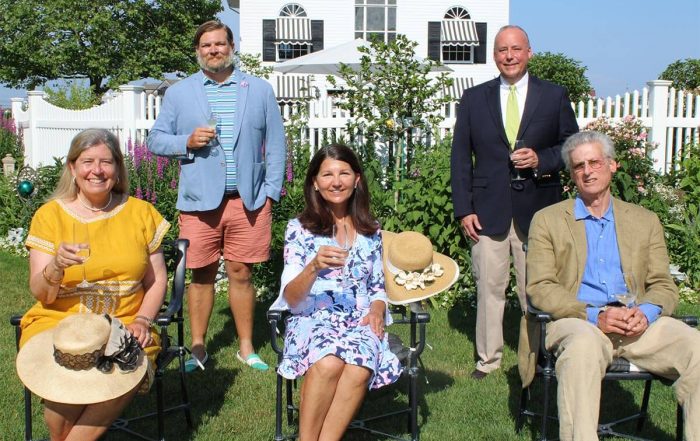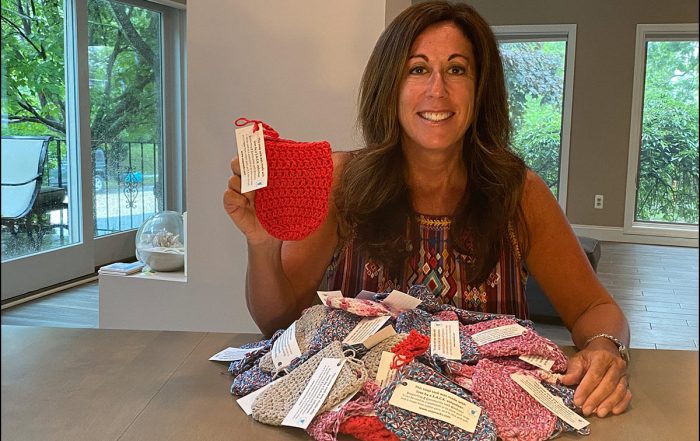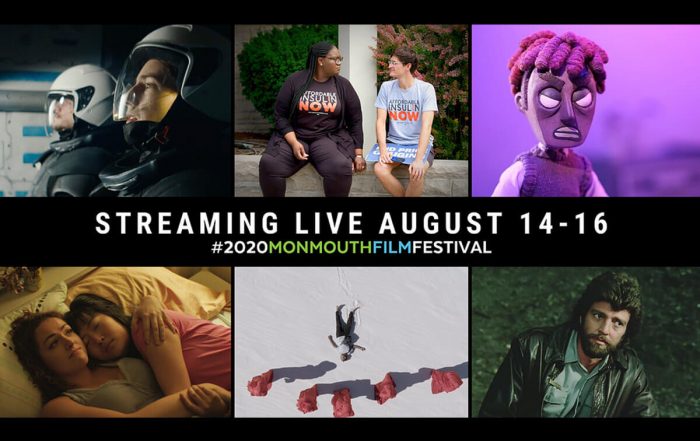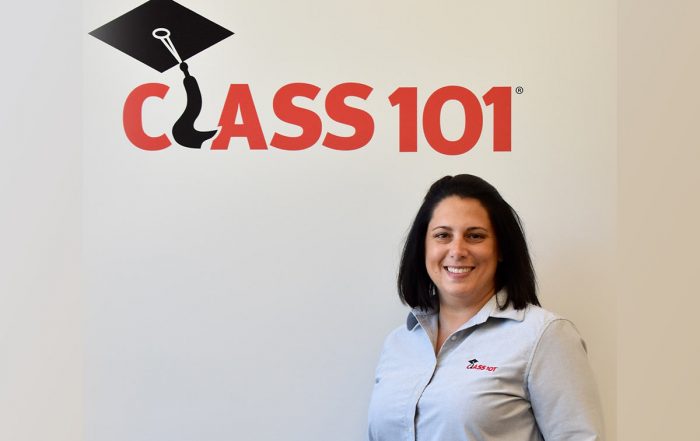By Jeanne Wall, Publisher and Editor – TAPinto Holmdel, Colts Neck & Middletown
FEATURED PHOTO: Donna Ongsiako | CREDIT: Melissa Amorelli Photography
“As I tried to shut the door, he charged at it and stuck the knife through the opening before I could shut it all the way. The knife cut the tip of my finger and I pulled my hand off the door. He got in. He was in my house standing in front of me with a knife, staring straight at me. He could have just held me at knife point, taken my car keys and left, again, another opportunity for him to leave, but he didn’t. He started slashing me…”
(an excerpt from Donna Ongsiako’s Victim Impact Statement)
Sometimes a movie or a book can have a lasting impact. You may leave the movie theater and you can’t stop thinking about the movie. Sometimes the experience changes how you feel about certain aspects of your life. Perhaps it changes your behavior in some way.
Maybe it moves you, stays with you. Maybe it changes you forever.
That is what Donna Ongsiako’s real life, nonfiction, story seems to do to everyone who hears her tell it, or anyone who reads her victim impact statement.
It is haunting. It is unbelievable.
In 2013, Donna was living happily with her daughter Kiersten, in an old farmhouse on a flower farm in bucolic Colts Neck. It was a peaceful place to live, it was home. “I was happy and carefree,” shared Donna. “I can honestly say that life was great.”
She had just shared a fun few days enjoying the 4th of July holiday with family and friends. The evening was winding down on July 6th and Donna was preparing to go to sleep.
It was shortly after midnight, the temperature was hot, very hot. A heat-wave had hit the east coast. Her home was dark, the lights were out, it was bedtime. Donna thought she heard her cat scratching at the door and went to let him in for the night.
She swung open her front door and stood face-to-face with a stranger. He had a knife. He immediately charged at the door as she tried to shut it, and without a word he began slashing her…
Donna chose to be anonymous at the time of the trial – not anymore.
This article is about Donna and her mission to help victims of violent crimes. This is about the amazing strength that she found within herself despite the heinous violent crime against her and all the suffering she bears everyday with her physical and mental scars; Donna has emerged and she’s speaking out. She’s helping others every day, on a mission to help victims of random violent crimes. Donna has founded Survivors of Violent Crimes, a 501(c)3 non-profit organization, which is a peer support group providing resources for survivors of violent crimes. The organization’s mission is also to raise awareness of PTSD.
I had the privilege to meet and get to know Donna in an exclusive series of in-person interviews, including accompanying her on the road at the Monmouth County Sheriff’s Office in Freehold, where she shared her story to help ninety cadet officers better understand crime from a victim’s perspective.
Donna, at the hands of a stranger, suffered a brutal stabbing attack. He stabbed her multiple times across the face, her neck, plunging the knife into her chest and then into the back of her neck… He left her to die. Walked over her saying, “You’re dead (explicit language)”. Then he took her car keys, stole her car and took off into the night.
After seven long hours of surgery where according to reports given to Donna there was doubt from many that she was going to make it; Donna survived—she was on life support.
Donna comments, “I remember waking up in the hospital in absolute disbelief. I was fortunate that some of the best trauma doctors in the country were at the hospital when the ambulance arrived. They eliminated some of the scarring that would have been front and center on my neck. They had to repair my internal injuries from all the wounds to my chest area. I have a continuous scar running from my neck and down my chest to the bottom of my sternum. I suffered nerve damage to one side of my body, causing my left side to have permanent nerve damage. I had surgery to repair the drooping of my eyelid; there is no surgery to repair the nerve damage. I woke up scarred forever. Looking at my face for the first time was something I will never forget. I was horrified. I had stitches and staples in my face, front of my neck, back of my neck, chest, abdomen, hand, my left arm was flail and my left eye was drooping… I was physically and mentally broken.”
For Donna it was the beginning of a very long road. “I was now living with post-traumatic stress disorder (PTSD), anxiety, depression, living in fear every moment. In addition, the person that did this to me was still out there somewhere. I knew he could come back and finish me off. My car was found and taken into evidence; my home was a crime scene that I would never return to live in.”
Eventually Donna’s attacker was caught. He was only 16 at the time of the crime. This article is not about him. (There are many articles from that time that can be searched online for details on the attacker). This is Donna’s story. Donna also won a civil trial against her attacker, and his father for hiding the whereabouts of his son.
Donna comments on the civil suit, “It’s not about the money, it’s about accountability. It felt so good when the judge validated my feelings that I had been violated. You can’t put a price on physical and mental scarring. My prescription for time off after the attack was for three months for the physical wounds to heal. What I would like to have is to be rewarded the opportunity to step back and take a mental break with the award that my civil suit could afford me. Since the attack the psychological healing has to happen when I can fit it in. Collecting on the civil award would afford the opportunity to take the time and explore different treatment modalities. It would create the opportunity to focus on healing both my daughter and me, to rebuild my life, my comfort and my safety. That financial burden falls on me, for the rest of my life.”
As part of her work with her nonprofit, Survivors of Violent Crimes, Donna’s contact information is given to victims of random violent crimes to call on her to help them on their journey of healing. Part of Donna’s mission is also to raise awareness of PTSD.
“Living with PTSD every day is extremely difficult,” noted Donna. “Every morning I wake up in fear, full of anxiety. I don’t sleep well. My anxiety skyrockets at night. I sleep with a light on, always. Waking in the morning starts a process of calming my nerves, I physically tremble, I need to regulate my breathing, I have to talk myself into the day and focus on getting from my home to my office. It’s a constant struggle to confirm that I am safe. It’s exhausting. It affects every part of my life. Fortunately for me, my employer has been over and above supportive, making allowances along the way. Having my job to go back to and move forward in was so important. It kept me moving, motivated, and gave me a sense of purpose amid horror and chaos. I am eternally grateful to them. For my speaking engagements it takes every ounce of my strength to get there and to make it happen, but I know it’s something I have to do to help others.”
Donna continues, “I am very fearful of people that I do not know, doors, and the dark. I am extremely fearful of anyone coming to my front door and I have to have notice from anyone that they are going to visit. I am absolutely terrified of certain situations, dark rooms, everyone to me is a possible threat. I see my physical scars every time I look in the mirror, but I live every moment of every day with my mental wounds, the invisible pain of PTSD is overwhelming and it is nearly six years later and I feel I have not had the time to try to give my mind the time to heal.”
Donna added, “The Parkland survivor who tragically died by suicide recently was also dealing with post-traumatic stress syndrome. We have to look for the symptoms for someone that has gone through trauma and realize that the face of PTSD can look like me, gets up every day, makes themselves look presentable, gets to work… there needs to be help, more awareness of what to look for. I am relieved that people are talking about PTSD with the Parkland suicide, and I feel that people look at me and think, ‘Oh she’s fine, look at her, she’s doing great.’ She smiled, “I’m not great. There is not a day, or even a minute that goes by that is not a struggle in dealing with my PTSD. It sucks you into the darkest deepest black hole that you can be in and I believe the girl in Parkland was in that dark place and I have been there.”
Chief Medical Officer of the American Foundation for Suicide Prevention, Dr. Christine Moutier, MD, said, “The internal experience of mental health conditions like PTSD is actually so profound it’s hard to put into words to help people understand. Just like physical pain can be intense but only the person experiencing it knows what it’s like, the same goes for symptoms that stem from changes in the brain. And just like physical pain changes over time and affects the person in different ways, the same goes for mental health symptoms. When we experience something traumatic, our physiology in our brain and body is affected. For some people that develops into a full-blown syndrome (PTSD) which takes on a life of its own, floods the body with stress hormones like cortisol on an ongoing chronic basis, causes the person to be on hyperalert for any potential threat, even when they are in a safe place. Sleep, mood, thinking, perception and processing can all be intensely affected. One reason it can be hard to see all of this going on in a loved one or colleague is that our culture hasn’t taught us a way to express these experiences. So, we grow up being socialized to ‘chin up’ and ‘what doesn’t kill you makes you stronger’. There are times when that’s terrific to work through challenges on your own; but there are other times when it becomes literally life threatening.”
“Don’t be afraid of the stigma of PTSD,” commented Donna. “It’s okay to fear PTSD but not the person that has it. That’s part of the problem because when you have PTSD you feel like no one can understand you because you are different from everyone else. Everyone expects you to move on and be your old self again and that’s impossible without the therapy and the time you need to take to go through the healing process.”
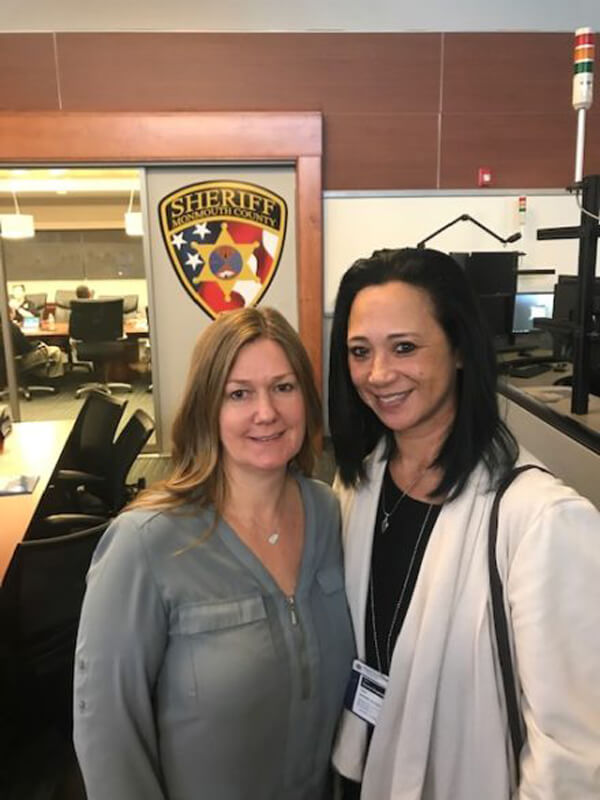
PHOTO: Nancy Frankie, Director, Victim Witness Unit Monmouth County Prosecutor’s Office, with Donna at the Monmouth County Sheriff’s Office with the Cadet Class where Donna shared her story
Donna, when speaking during normal conversation, often seems sad. However, when she talks about the first responders on the scene of the attack, Officer Tom Ward for instance, her face lights up. When she speaks about her victim advocate assigned to her since the attack; Nancy Frankie, her face lights up. Donna credits a large part of her ability to function to Nancy Frankie, Director, Victim Witness Unit Monmouth County Prosecutor’s Office.
“Nancy Frankie has helped me so much since she was assigned to my case,” said Donna. “I would have never made it this far without Nancy. She is someone who I feel has helped me more than anyone in my journey to heal and to help others.”
Donna, as part of her mission to help others, now assists Nancy in presentations to cadet classes, speaking about the victim’s perspective and how important first responders are. “I believe Tom Ward (Colts Neck Police) and the other officers and first aid responders saved my life, along with the surgeons of course,” said Donna. “The way Tom cradled my head and the first aid that was administered by everyone kept me alive until the doctors could take over. Speaking to the cadets and telling my story in detail gives them insight from the victims perspective, lets them know the vital role they will play in saving lives.”
In addition to the cadet classes, Donna visits state prisons speaking to groups of inmates showing them and explaining to them from the victim’s perspective the destruction caused by senseless violent crimes.
“I’ve watched grown men, hardened criminals brought to tears after hearing my victim impact statement and seeing the pictures of my wounds,” said Donna. “I know my talks are changing their pattern of thinking.” Donna also speaks to criminal justice classes at colleges, explaining the victim’s perspective and the vital role criminal justice serves.
Nancy Frankie, Director, Victim Witness Unit Monmouth County Prosecutor’s Office, said, “I have been working with Donna from the beginning of this terrible crime, and over the years I’ve had the opportunity to watch her work through her process and evolve from this experience. Donna has been sharing her story with police recruits for years; with each presentation, she is able to initiate a tremendous impact. She expands their compassion, which in turn changes their life, and influences how they will treat future victims in their career. You mentioned that Donna has a light within her, which you say is special.”
“After I was attacked, I soon realized that there were great support groups with many resources available for victims of domestic violence and many other categories, but there was no organization in place to help victims of random acts of violence,” said Donna. “I left the hospital displaced from my home, paying car payments on a car that was impounded as evidence, and I lived in constant, intense fear. I was fortunate enough to have an employer who kept me employed, and when I could physically go back to work my job was waiting for me, but not everyone has that situation. I was physically and mentally devastated.”
When criminals are sentenced, they are hit with a fine and that money goes into a Victims of Crime Compensation Organization (VCCO) which covers any crime related injuries, repair, relocation, doctor’s co-pays, prescriptions, but the victim is capped at $25,000. Donna’s surgeries were covered mainly under her employer’s insurance, but the repair of her eye was a battle to have covered because it was considered plastic surgery. Eventually, with the doctor lowering the price and finally the VCCO agreeing it was necessary surgery, the VCCO paid. Currently Donna is near her cap with the VCCO. “Innocent victims should not have to struggle to pay for treatments,” said Donna. “I need ongoing therapies for my PTSD and soon my VCCO contribution will be maxed out. There are no benefits to cover my treatments and that is not the way it should be.”
Raising awareness of PTSD is something that Donna is very passionate about. It’s a big part of her mission for Survivors of Violent Crimes. “I decided to form Survivors of Violent Crimes to be a resource offered to anyone who finds themselves in a situation like mine,” shared Donna. “See me, I look like everything is fine right? This is what PTSD looks like. This is the invisible condition that needs intense therapies. We need to talk about it, start the conversation. I want every victim of a violent crime to understand and feel the following: YOU MATTER, you have a voice, you are not alone, and your story can help others.”
In Monmouth County, when someone is a victim of a violent crime, the victim advocate assigned can provide the victim with Donna’s Survivors of Violent Crimes information and her phone number to contact. When Donna gets a call from a victim, she goes as quickly as she can to be there for that person. Donna Ongsiako has emerged from darkness, providing a light to so many.
For more information about Survivors of Violent Crimes, visit here.
For the full story and to listen to Donna, in her own words, speak about her violent attack in detail, click here.
Recommended for you
Kids with Cancer Need Help… Here’s What You Can Do
The daily burdens thrust upon families who are battling pediatric cancer are [...]
Monmouth County Historical Association Virtually Celebrates Annual Garden Party
FEATURED PHOTO: MCHA Executive Committee: (l to r front row) Kathy Jones (2nd [...]
Meet Your Neighbor: Stacy Wiener
FEATURED PHOTO: This is where caption text will go for featured photo. As [...]
Monmouth Film Festival Redefines the Festival Experience this August
As film and theater folk like to say, the show MUST go on, [...]
Meet Your Neighbor: Laura Ciccone, Educational Advisor
FEATURED PHOTO CREDIT: Cathy Padilla Laura Ciccone lives in Lincroft with her [...]
Pet Celebs: August 2020
Your pets can be celebrities too. Send in a photo to info@communitymagazinenj.com! [...]



